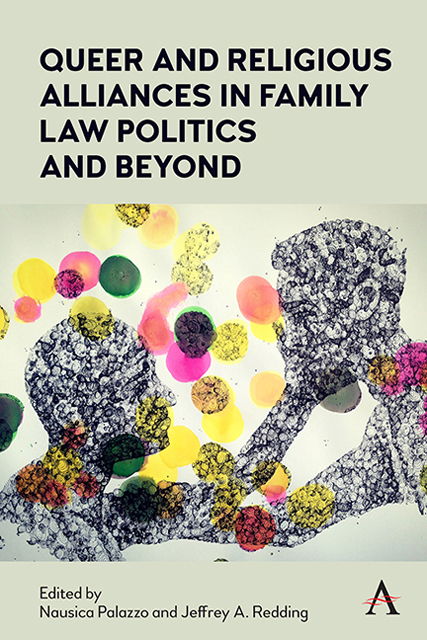Chapter 7 - Queer and Religious Convergences around Nonconjugal Couples: What Could Go Wrong?
Published online by Cambridge University Press: 09 December 2022
Summary
This book elaborates on a counterintuitive idea. Religious conservativism in family law could have more in common with queer politics than liberal politics, with queer designating “whatever is at odds with the normal, the legitimate, the dominant [as t]here is nothing in particular to which it necessarily refers” (Halperin 1995, 62). I focus on a specific illustration of this idea, by looking at certain nonmarital regimes introduced in the West from the end of the nineties with the goal of obstructing marriage equality.
Laws open to friends or relatives were enacted by same-sex marriage opponents in, for instance, Alberta, Vermont, Hawai’i, Victoria, Tasmania, and New Zealand. Similar laws have been defined “[t]he backlash version of the embracing of domestic partnerships” (Boyd and Young 2003, 768). The mobilization of the conservative groups behind them was not animated by a desire to promote plural family values and recognize a larger set of families. The idea was to grant legal recognition to same-sex couples while at the same time preserving traditional marriage, as well as diluting the symbolic value of same-sex couple recognition into a larger basket of desexualized relationships. Yet, such reforms virtually aligned with a queer ambition to debunk stereotypes around family. Amongst these stereotypes is the sexual and romantic nature of the union, challenged by the recognition of committed unions of adult friends and relatives (nonconjugal couples).
The recognition of nonconjugal families is a worthwhile project from the perspective of queer politics. There is a fascinating body of literature on the much-needed shift in law's focus from sex to care. By reducing law's attachment to sexual relationships, these theories suggest, law could finally also recognize nonconjugal families where important caretaking work occurs. In Canada, the debate was sparked by the seminal work of the Law Commission of Canada, an independent federal law reform agency advising the government to shift law's focus on nonconjugal couples already in 2001 (Law Commission of Canada 2001, 37; see also Cossman and Ryder 2001). The United States and the United Kingdom have also been a wellspring of seminal reflections in this area.
- Type
- Chapter
- Information
- Queer and Religious Alliances in Family Law Politics and Beyond , pp. 125 - 146Publisher: Anthem PressPrint publication year: 2022

